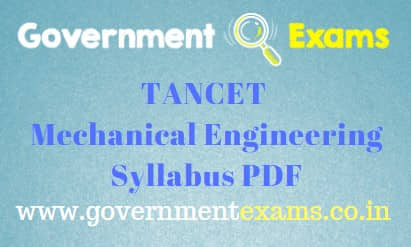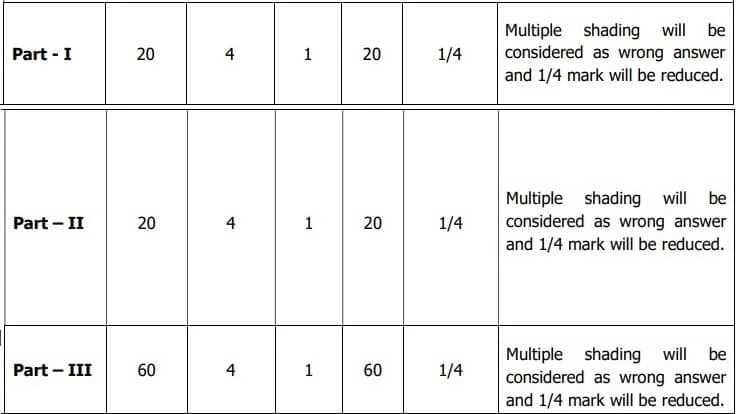TANCET Mechanical Engineering Syllabus PDF:
Anna University, Chennai has officially announced the Common Engineering Entrance Test and Admission (CEETA-PG 2024)on behalf of the Government of Tamil Nadu. Candidates are interested in M.E./M.Tech./M.Arch./M.Plan. Degree Programmes offered at university departments, and constituent colleges of Anna University can check the official notification and apply till 07-02-2024. Here we uploaded the TANCET Mechanical Engineering Syllabus, Model Question Paper with answers in PDF, and the Exam Pattern was uploaded and the same is given below. Candidates who took the CEETA-PG Entrance Exam can check the complete Mechanical Engg syllabus and Exam Pattern along with the question paper below. Check the TANCET Mechanical Engineering Syllabus PDF below:
Important dates of Anna University CEETA-PG 2024:
- Starting date for Online Registration: 10-01-2024
- Last date for Online Registration: 07-02-2024
- Downloading of Hall Ticket: 25-02-2024 (Tentative)
- Date of M.E./M.Tech./M.Arch./M.Plan Exam: 10-03-2024 10 AM to 12 PM (Sunday)
To see and check the complete CEETA-PG Exam 2024 notification and important details, check the link – TN CEETA PG 2024
For those looking for the TANCET Mechanical Engg. Previous Year Question Papers PDF, Check the link – TANCET Mechanical Engg. Question Papers PDF
TANCET Mechanical Engg Syllabus & Exam Pattern:
TANCET Mechanical Engineering M.E/M. Tech entrance exam consists of three Parts
- Part I: Engineering Mathematics – (Common to all candidates)
- Part II: Basic Engineering & Science – (Common to all candidates)
- Part III: Department Paper
Check the complete syllabus is updated below:
For the complete TANCET Syllabus 2024 PDF, Check the link – CEETA-PG Mechanical Engg. Syllabus PDF
Mechanical Engineering Syllabus – M.E/M.Tech:
PART – I Engineering Mathematics (Common to all Candidates)
– Determinants and Matrices:
– Calculus and Differential Equations:
– Vector Calculus:
– Functions of Complex Variables and Complex Integration:
– Transforms:
– Numerical Methods:
– Applied Probability:
Part – II Basic Engineering & Science – (Common to all candidates)
– Applied Mechanics:
– Mechanical Engineering:
– Physics:
– Material Science:
– Civil Engineering:
– Electrical Engineering:
– Computers:
– Chemistry:
Part – III Mechanical Engineering
Mechanics, Kinetics and Dynamics :
Statics of Particles, Equilibrium of Rigid bodies, Properties of Surfaces and Solids, Dynamics of Particles, Friction and Elements of Rigid Body Dynamics, Basics of Mechanisms, Gears and Gear Trains, Friction in Machine Elements, Force Analysis, Balancing, Single Degree Free Vibration, Forced Vibration, Mechanisms for Control and Vibration.
Strength of Materials and Design :
Stress, Strain and Deformation of Solids, Transverse Loading on Beams and Stresses in Beams, Torsion, Deflection of Beams, Energy Principles, Thin Cylinders and Thick Cylinders, Spherical Shells, Fundamentals of Design for Strength and Stiffness of Machine Members, Design of Shafts and Couplings, Design of Fasteners and Welded Joints, Design of Springs, Design of Engine parts, Design of Bearings, Design of Flywheels, Design of Transmission Systems for Flexible Elements, Spur Gears and Parallel Axis Helical Gears, Bevel Gears, Worm Gears and Crossed Helical Gears, Design of Gear Boxes, Design of CAM, Clutches and Brakes.
CAD / CAM / CIM / FEA :
Fundamentals of Computer Graphics, Geometric Modeling, Visual Realism, Assembly of Parts, CAD Standards, Fundamentals of CIM, Production Planning and Control and Computerized Process Planning, Cellular Manufacturing, Flexible Manufacturing System and Automated Guided Vehicle System, Industrial Robotics, One Dimensional Problems in FEA, Two Dimensional Scalar Variable Problems, Two-dimensional vector variable Problems, Isometric Parametric Formulation.
Materials Science and Metallurgy :
Constitution of alloys and phase diagrams, steels, cast iron, TTT diagram, heat treatment of ferrous and non-ferrous metal, surface modification techniques, non-metallic materials, mechanical properties and testing, crystal defects and strengthening mechanisms, conducting and semi-conducting materials, magnetic and dielectric materials, Engineering ceramics, Engineering and commodity polymers.
Production Technology :
Foundry Technology, Hot and Cold working, metal forming processes, metal joining processes, welding metallurgy, welding defects, Metal cutting, center lathe and special purpose lathe, drilling, milling, grinding, gear cutting, broaching unconventional machining processes, CNC machine tools, Part programming.
Metrology and Measurements :
Linear and angular measurements, Interferometry-laser interferometers – Types, Computer Aided Inspection, Basic concept of CMM- Types of CMM, Machine vision, Form measurement StraightnessFlatness, Roundness, Surface finish measurement, Measurement of power, flow and temperature.
Thermodynamics: Basic concepts, Zeroth, First and Second laws of thermodynamics; thermodynamic system and processes; Carnot cycle. irreversibility and availability; behavior of ideal and real gases, thermodynamic relations, properties of pure substances, calculation of work and heat in ideal processes; analysis of thermodynamic cycles related to energy conversion, Fuel and combustion.
Heat and Mass Transfer: Modes of heat transfer; one-dimensional heat conduction, resistance concept, electrical analogy, unsteady heat conduction, fins; dimensionless parameters in free and forced convective heat transfer, various correlations for heat transfer in flow over flat plates and through pipes; thermal boundary layer; effect of turbulence; radiative heat transfer, black and grey surfaces, shape factors, network analysis; heat exchanger performance, LMTD and NTU methods.
Basic Concepts of Mass transfer – Diffusion Mass Transfer – Fick’s Law of Diffusion – Steady state Molecular diffusion – Convective Mass Transfer – Momentum, Heat and Mass Transfer Analogy – Convective Mass Transfer Correlations.
Applications: Power Engineering: Steam Tables, Rankine, Brayton cycles with regeneration and reheat. I.C. Engines: air-standard Otto, Diesel cycles. Refrigeration and air-conditioning: Vapour refrigeration cycle, heat pumps, gas refrigeration, Reverse Brayton cycle; moist air: psychrometric chart, basic psychrometric processes. Turbomachinery: Pelton-wheel, Francis and Kaplan turbines – impulse and reaction principles – velocity diagrams
Fluid Mechanics: Fluid properties; fluid statics, manometry, buoyancy; control-volume analysis of mass, momentum and energy; fluid acceleration; differential equations of continuity and momentum; Bernoulli’s equation; viscous flow of incompressible fluids; boundary layer; elementary turbulent flow; flow through pipes, head losses in pipes, bends etc.
For the complete TANCET Syllabus PDF 2023 Check the link – CEETA-PG Mech Engg Syllabus PDF
For those looking for the TANCET Mechanical Engg. Previous Year Question Papers PDF, Check the link – TANCET Mechanical Engg. Question Papers PDF


